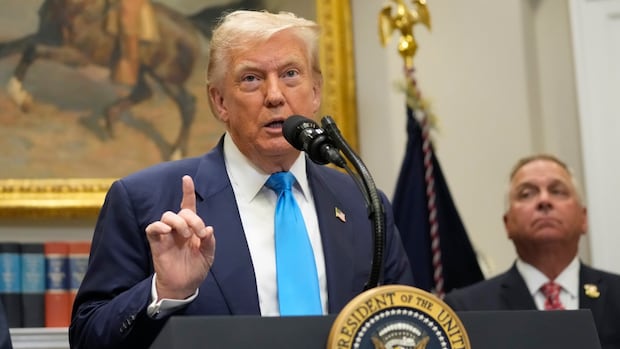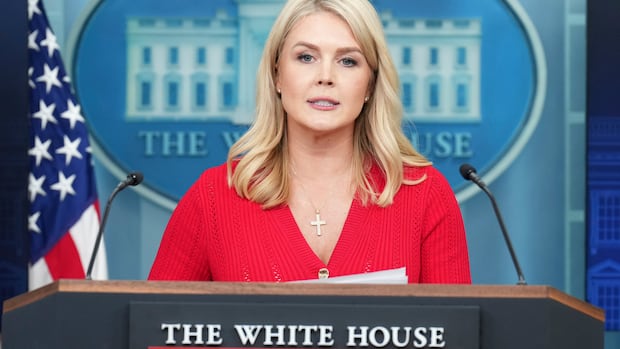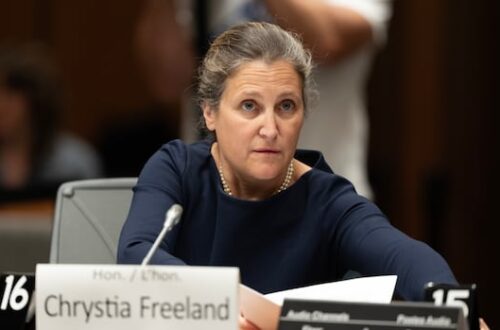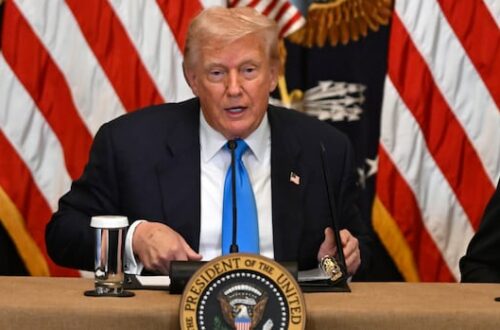Most of the tariffs that U.S. President Donald Trump has imposed on countries around the world face a crucial legal test on Thursday.
The hearing before the U.S. Court of Appeal for the Federal Circuit involves a pair of lawsuits challenging the 25 per cent tariff Trump levied on imports from Canada and Mexico in March and what Trump called his “Liberation Day” tariffs, imposed on nearly every other country in April.
At issue is whether Trump’s justifications for the tariffs hold any legal water, given the president has limited powers to levy duties on foreign countries.
Canada is watching the case closely because of its implications for the tariffs Trump imposed ostensibly to combat cross-border fentanyl trafficking — tariffs that he’s threatening to raise to 35 per cent on Friday.
Todd Tucker, director of industrial policy and trade at the Roosevelt Institute, a Washington think-tank, says the legal challenge to Trump’s tariffs has global economic implications.
“Trump is disrupting global trade relations in a way that we haven’t seen since the 1930s,” Tucker said in an interview with CBC News.
When asked by a reporter if Canada could see a similar trade deal with the United States as the European Union’s, which includes a 15 per cent tariff, Prime Minister Mark Carney said Europe and Canada have different relationships with the U.S., particularly because the U.S. needs Canadian energy.
“Some kind of favourable, even partial victory for the plaintiffs in these cases will sort of put the global economy back on a more secure footing,” he said.
The case, which has moved further through the courts than any other legal challenge of Trump’s tariffs, brings together two related lawsuits:
Both sets of plaintiffs won their case at the U.S. Court of International Trade in late May.
That ruling found the president overstepped his authority under the International Emergency Economic Powers Act (IEEPA), the statute Trump used to impose both sets of tariffs.
Oral arguments take place Thursday in the Trump administration’s appeal of that ruling
Jeffrey Schwab, senior counsel at Liberty Justice Center, a non-profit public interest litigation firm representing the five small businesses, says the case aims to rein in what he describes as presidential overreach.
“The case is about whether the president has the power to unilaterally impose tariffs on any country he wants, at any rate he wants, at any time he wants, for any reason he wants,” said Schwab in an interview with CBC News.
“Congress ultimately has that power under our constitution, and although Congress can delegate that power to the president, they have not done so.”
Do tariffs ‘deal with’ fentanyl crisis?
The IEEPA gives the president the authority to use emergency economic measures to “deal with any unusual and extraordinary threat … to the national security, foreign policy, or economy of the United States.”
The Trump administration’s argument — both in his executive order levying the tariffs on Canada and in its legal brief filed for the appeal — is that the flow of fentanyl across the country’s northern border constitutes that “unusual and extraordinary threat.”
The administration claimed the tariffs “deal with” the fentanyl threat by giving the U.S. leverage to pressure Canada to address the issue.
Trump’s justification for the tariffs on Mexico is similar: that drug trafficking and illegal immigration across the southern border constitute an emergency, and that tariffs provide leverage to force the Mexican government to take action.
But the Court of International Trade didn’t buy those arguments.
As the Aug. 1 deadline for a trade deal between the U.S. and Canada draws near, U.S. President Donald Trump said Friday he may just impose tariffs rather than reach a deal.
‘Pretty major national significance’
The court ruled that the tariffs on Canada and Mexico do not actually deal with the specific threats Trump cited. It also ruled that the “Liberation Day” tariffs were applied too broadly across the globe to be truly addressing an emergency.
That ruling struck down both sets of tariffs, but almost immediately, the Trump administration requested and obtained a stay, which meant the tariffs have continued to apply.
Molly Nixon, a Washington-based attorney at Pacific Legal Foundation, a national public interest firm, says whichever side wins the appeal, it’s very likely headed to the U.S. Supreme Court.
“This is a question of pretty major national significance,” Nixon told CBC News. “I would be very surprised if the Supreme Court didn’t review the case.”
No president before Trump has used the IEEPA to impose tariffs.
His predecessors have used its powers to levy sanctions on enemy regimes, to ban transactions with groups that are deemed terrorist organizations or to freeze the assets of designated transnational criminal organizations.

Small business owner ‘deeply invested’ in case
While Canadians are predominantly interested in the case for its impact on the fentanyl tariffs, David Levi, an electrical engineer in Charlottesville, Va., is deeply invested in the “Liberation Day” side of the case.
Levi owns MicroKits, a small business that designs and sells make-them-yourself gadget kits and musical instruments. His company is one of the five small-business plaintiffs pursuing the lawsuit.
“The tariffs really affect me, because I have to buy parts internationally,” Levi said, adding that the high tariff rates announced on Chinese imports and the uncertainty over costs disrupted his business.
“My worker who actually puts all the parts together, her hours have been cut 40 per cent and in the last three or four months we’ve missed out on thousands of units of production,” he said.
The Power Panel discusses two U.S. court decisions that blocked, then reinstated, President Donald Trump’s broadest tariffs after an immediate appeal from the White House.
Appeal court ruling expected within weeks
Thursday’s hearing is before the U.S. Court of Appeal for the Federal Circuit.
The case is moving through the courts at what is, for the U.S. legal system, lightning speed. Legal observers say they expect the appeal court to issue a ruling within weeks, likely by early September.
That could soon be followed by the losing party petitioning the U.S. Supreme Court to hear an appeal.
The case does not address Trump’s 50 per cent tariffs on steel and aluminum imports from around the world, which he imposed using a different statute, the president’s long-established power to levy duties on imports for reasons of national security.
Other Canadian exports that comply with the rules of origin in the Canada-US-Mexico Agreement are exempt from the fentanyl tariffs, which means nearly 90 per cent of Canadian exports can enter the U.S. tariff free.








